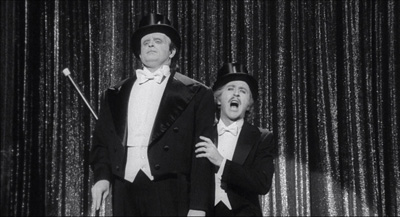Viking Night: Young Frankenstein
By Bruce Hall
June 7, 2017
Yes, it’s a question that plagued the world of literature, and later film, for over 150 years. Fortunately, Brooks and Wilder answered the bell, and their story is part adaptation of Mary Shelley’s novel, and part loving mockery of Universal’s classic monster franchises. And one of the best things about lampooning an existing story is that you already have your basic plot; what you have to do is pull the humor out of it and make it relatable to the audience. Brooks first achieves this by filming on black and white stock and using an original but genre-appropriate score.
Best of all, he and WIlder surreptitiously incorporate enough contemporary sexual humor to make you laugh unexpectedly, while stopping just short of being crass or lazy. They also set the story in the present day (1974, that is), giving them the latitude to do this credibly. We meet Dr. Frederick Frankenstein (Wilder), who is a respected neurosurgeon to the point where he’s managed to (mostly) outrun his family’s infamous reputation. He’s even gone so far as to (hilariously) change the pronunciation of his famous name to “Fron-ken-steen”.
Thusly, the good Dr. Fronkensteen is even engaged to be married. His bride to be is a vapid, self centered (but always immaculately dressed) socialite named Elizabeth (played by Madeline Kahn’s epic cheekbones). It’s all good work if you can get it, and everything would seem to be well in the house of Fronkensteen.
Then, the Doctor receives word that he’s been named sole inheritor of the family estate in Transylvania. Upon arriving there, he is introduced to his hunchbacked servant Igor (pronounced “eye-gore” and played by Marty Feldman), and ditzy lab assistant Inga (Teri Garr). The estate is run by a menacing housekeeper named Frau Blucher (Cloris Leachman), and the nearby peasant village is under the protection of the menacing police inspector Kemp (Kenneth Mars). It’s an eccentric bunch, played to absolute perfection by a cast that was clearly having a great time doing it.
The story is, from there, pretty similar to the one you probably remember hearing as a child, and then not sleeping for days afterward.
The Doctor predictably discovers his grandfather’s laboratory and notes, and becomes convinced he is able to succeed where his ancestor failed. That’s not really a spoiler, is it? Letting you know that Dr. Frankenstein - er - Fronkensteen eventually does get around to making a monster? Good. Without going into further detail, things go hilariously wrong. A sweet-natured but emotionally unstable creature is created. One that has a weakness for music and looks like the love child of J.J. Watt and Brock Lesnar, having been repeatedly dropped on concrete after delivery.
And no, I don’t know which one of them would carry the child in that scenario.
The Monster is played by Peter Boyle, perhaps best otherwise known (much later, of course) as the Dad from Everybody Loves Raymond. His portrayal is sweet and vulnerable to the degree that most of it could be seamlessly inserted into one of the official Frankenstein movies. However, this is a Mel Brooks joint, which means there will also at some point be improv, singing and dancing. Even within his “monster” persona, Boyle has no difficulty keeping up with his cast mates. If you watch closely, you can see how well everyone plays off the other, down to spot on improvisation of reactions. Young Frankenstein full enough of quotable lines to make a new script, and you’ve probably heard most of them even if you haven’t seen the film:
Care for some Ovaltine?
Do NOT open this door!
Ah, genius. Perhaps the best thing about Young Frankenstein is that Brooks himself does not appear on screen - and that’s not meant to be mean. This was famously at Wilder’s request, as he felt the director’s distinctive presence would be distracting to the tone of the film. Wilder was right, and Brooks was smart to acquiesce. Those mark the first two of a nearly unbroken string of correct decisions that make this movie what it is.
As you’ve no doubt guessed, I could go on for another two thousand words, but they didn’t hire me to write wistful fanboy rhapsody. Young Frankenstein is a rare and historic convergence of brilliance and restraint that doesn’t happen quite often enough in Brooks’ legendary oeuvre, but it seems to happen every time Gene Wilder or Madeline Kahn are involved. How odd is that? And how wonderful it is that the film’s ending, which I’d entirely forgotten, was the brilliant comedic callback that prompted the first sentence of this article.
In fact, I think I’ll just end on that.
I can say without hesitation (and with tremendous joy) that Young Frankenstein is one of my all-time favorite films.
Continued:
1
2
|
|
|
|




